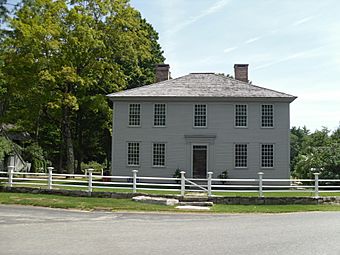Arah Phelps Inn facts for kids
|
Arah Phelps Inn
|
|
|
U.S. Historic district
Contributing property |
|
 |
|
| Location | Jct. of Prock Hill Rd. and CT 183, Colebrook, Connecticut |
|---|---|
| Area | 2 acres (0.81 ha) |
| Built | 1787 |
| Part of | Phelps Farms Historic District (ID83001249) |
| NRHP reference No. | 71000905 |
Quick facts for kids Significant dates |
|
| Added to NRHP | August 5, 1971 |
| Designated CP | August 18, 1983 |
The Arah Phelps Inn is a very old house in Colebrook, Connecticut. It was built way back in 1787. This makes it one of the oldest buildings still standing in Colebrook.
For many years, it was a busy stop for travelers. People riding stagecoaches between Hartford and Albany would stay here. Today, it is a private home. The inn is also listed on the National Register of Historic Places. This means it is an important historical site.
What Does the Arah Phelps Inn Look Like?
The Arah Phelps Inn is located in a quiet, country part of northern Colebrook. It sits near where Route 183 meets Prock Hill Road. This inn is part of a larger group of old farm buildings. These buildings belong to the Phelps family.
Building Features and Design
The inn is a two-story building made of wood. It has a special roof shape called a hip roof. There are two chimneys inside the house. The outside walls are covered with wooden boards called clapboards.
The front of the house has five sections, with the main door in the middle. The door has decorative columns on the sides. Above the door is a small window and a fancy top part. Inside, the house has an unusual layout. The main stairs are at the back of the house. This is because the entire front of the second floor was a large ballroom.
History of the Inn's Construction
Arah Phelps and his father, Josiah Jr., built the inn in 1787. The land itself was given to Josiah Phelps Sr. in 1720. Arah Phelps ran the inn for almost 50 years. Later, he passed it on to his son, Edward. The inn and the surrounding farmland are still owned by the Phelps family today.
In 1942, a fire caused some damage to the building. However, it was carefully rebuilt using materials from that time period. This helped keep its original look and feel.
 | Sharif Bey |
 | Hale Woodruff |
 | Richmond Barthé |
 | Purvis Young |



